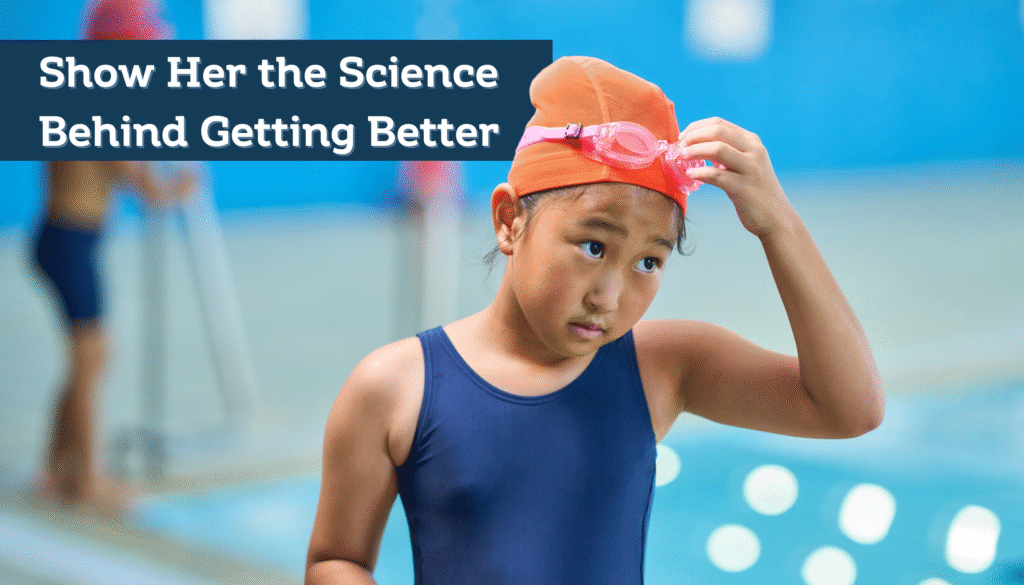The skills listed here not only support career success but also significantly impact emotional resilience, relationship quality, and overall life satisfaction. Fostering these in your daughter will stand to her in her journey through life and increase her chances of having the happy life you want for her.
- Growth Mindset: Encouraging girls to embrace challenges with a “not yet” approach fosters resilience and confidence. According to Carol Dweck’s research on growth mindset, viewing effort as a pathway to improvement makes children more likely to succeed academically and in life. Embracing a growth mindset can help them view setbacks as learning opportunities rather than failures.
Make ‘Not yet’ your new mantra. When your child moans about not being able to do something, you respond positively with ‘not yet’. Indicating that, whatever the task is, she is capable of doing it but just hasn’t figured it out yet. Allow your child time to figure it out and resist jumping straight in to do it for her.
- Resilience and Self-Esteem: Building resilience helps girls adapt to life’s ups and downs. Celebrating small wins and focusing on effort rather than perfection strengthens self-worth and promotes emotional resilience (Harvard Summer School)
- Independence and Decision-Making: Giving girls opportunities to make decisions—whether through chores, small projects, or personal goal setting—builds self-reliance. Research from the Child Mind Institute supports that fostering independence from an early age helps children develop a stronger sense of self-confidence and problem-solving abilities.
- Teamwork and Empathy: Participating in group activities teaches girls the value of collaboration and empathy. Research shows that children involved in team sports tend to report higher self-worth and confidence, learning to balance individuality with collective success (American Psychological Association).
- Effective Communication: Teaching girls active listening and self-advocacy promotes self-assurance in social interactions. According to the Harvard Graduate School of Education, children who learn communication skills are more likely to build positive relationships, engage openly, and support their viewpoints effectively.
- Financial Literacy: Financial literacy offers young girls the skills for future self-sufficiency. The Girl Scouts of the USA promotes teaching financial literacy early to empower girls to make smart financial choices, plan for their goals, and gain confidence in managing money responsibly.
- Self-Love and Body Positivity: Promoting self-acceptance helps girls focus on their inner strengths rather than just appearance. Studies from the Dove Self-Esteem Project show that girls who focus on their talents and character are better equipped to resist social pressures related to appearance and are more likely to cultivate self-confidence.
- Critical Thinking and Problem-Solving: Activities that promote critical thinking prepare girls to approach challenges with clarity and independence. According to studies in the Journal of Child Psychology, critical thinking fosters independence by helping girls evaluate situations and make informed choices that reflect their values and understanding.
- Creativity and Self-Expression: Encouraging self-expression through arts, sports, and other activities allows girls to explore and understand their identities. Studies show that creative outlets provide emotional benefits, enhancing confidence and self-worth (The Child Development Institute).
- Setting Boundaries and Assertiveness: Teaching girls to set boundaries and communicate assertively fosters self-respect and independence. According to Psychology Today, learning how to assert boundaries helps girls protect their values and priorities, leading to more fulfilling relationships and personal autonomy.
Conclusion
These are ten key skills that will help your daughter navigate the challenges of life, education and beyond. They will stand to her and help her succeed both professionally and personally. Fostering these ten skills in your daughter might not be as hard as it seems. Many require simple intervention from you like the ‘not yet’ mantra. Also if your daughter is already involved in team sports this is already helping her work on her teamwork and communication skills. As an advocate and science nerd, taking up science as a hobby can build resilience, decision making and boost a growth mindset. The main point is that you are aware of these skills and their importance in raising a strong independent happy child. Then you can start simple habits or introduce activities that can help your child gain these abilities.
Check out my blog post on From Curiosity to Confidence: 5 Reasons Girls Need Science in Their Lives for more insight into what Science can do for your daughter. If you want to introduce your child to science or if she already has an interest in STEM you should definitely take a look at my book series, Hey Smart Girl.
Opinion? What do you think, did I miss a skill that you think should be listed? Any tips or tricks for helping children develop these core strengths? Comment below.








One Response
Your words have the power to transport the reader, making them see the world from a perspective they hadn’t considered before.